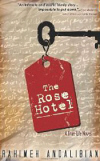The Rose Hotel
Rahimeh Andalibian calls The Rose Hotel a “true-life novel,” and aside from made-up scenes where she was not present, the book is a factual account of her family’s tragedies and secrets that reads like a novel. In spite of the chapters’ brevity and the book’s fast pace, the fully depicted scenes put us in the story while also proving informative regarding various cultural details.
Rahimeh Andalibian calls The Rose Hotel a “true-life novel,” and aside from made-up scenes where she was not present, the book is a factual account of her family’s tragedies and secrets that reads like a novel. In spite of the chapters’ brevity and the book’s fast pace, the fully depicted scenes put us in the story while also proving informative regarding various cultural details.
Andalibian’s family had numerous bad experiences, which start in Iran, continue in London, and end in California. We feel for the well-developed characters, especially her parents and her four brothers. The author’s career in psychology governs her approach in this novel:
My family has shown tremendous courage and trust in sharing their darkest moments. . . . By making ourselves vulnerable and visible we have also become more fulfilled and alive. . . . And you too [may] have come to recognize in them characters from your own lives. It is my hope that you have come to see them and yourself—as I do: flawed, brave, resilient, and beautiful.
Andalibian gives us two settings, both of which dominate the family. In the wonderful opening scene, the author as a child and her younger brother hide in and explore the magic of the Rose Hotel, run by their father. Their neighborhood also includes the dazzling gold dome of the great mosque Haram, second only to Mecca for Shi’a Muslims. On the hotel’s nameplate a nightingale often perches, an auspicious omen. Their father Baba, being devout, forbids music or alcohol in the hotel, and at home everyone keeps to traditions—eating on a sofreh, a soft plastic cover on the floor, and the males buttoning their shirts right up to the top.
Trouble begins with a brutal rape and the rebellion of the older son, fifteen-year-old Abdollah, with horrific consequences for the family. These events affect them for years to come, threatening to destroy the parents’ relationship and the sons’ survival. What makes the consequences worse is the brutality of the Shah and continuation of brutality in the ayatollahs’ takeover. We in the West think of the Shah as a positive influence on his country for his western ways, but here we learn the truth of his police state. Baba hinges all his hopes on Khomeini and the religious ayatollahs, who he assumes will not be corrupted by power. Baba would seem to have a privileged relationship with this new regime, especially with Mrs. Khomeini, for whom Baba’s wife has cooked elaborate meals to be taken to Mrs. Khomeini’s secret suite at the hotel. And Baba has kept certain ayatollahs from danger. Therefore, he has every hope that his very personal and desperate plea will be heard. However, it is a regime in transition with justice not fully formed:
In the West, “Ayatollah” came to mean that one man Khomeini, but in Iran, there are many ayatollahs holding positions similar to bishops. Each ayatollah held his own views. And even at the launch of this new regime, many ayatollahs dissented; this was not the way of Islam. . . . Baba overheard a man ask, ‘This is what our country has become?’ Shepherds with a few religious classes under their belt and no legal experience will decide our fate? This is not what we wanted from our revolution. Now we are all screwed.’
Add to that chaos of the Iran-Iraq War, which Saddam Hussein starts. The personal mirrors the political climate to make the family situation worse. Baba, whose only concerns are to safeguard his family, makes several bad mistakes, adding to the horror of the situation. As a result, the health of the children’s mother, Maman, deteriorates, forcing the parents to leave most of the children with strangers while they seek medical help in London. And when they finally all reunite in California: “Home would have to be where we were, not where we’d been.” During this time, a pattern emerges, that “both my parents had younger siblings that they’d lost, and the way they’d dealt with it was not to tell the children any details, no goodbyes, to ‘protect them from the truth.’”
Our father also battled with some inner rage, guilt that he could not share. His life’s mission was now to save us, and he would do anything, absolutely anything to do that but his culture and code of behavior struck us as dictatorship, and we all fought back in our own way.
Andalibian, training herself as a family therapist, forces the family to break the bonds of secrecy and the past. Her page-turning novel educates us, but mostly makes us care about the family’s pain, her brothers with their death-defying risks, and Baba with all his desperate but flawed efforts. The Rose Hotel is an enthralling story from a country that many know little about.





